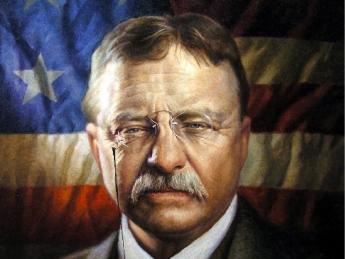Related Topics
Philadelphia Politics
Originally, politics had to do with the Proprietors, then the immigrants, then the King of England, then the establishment of the nation. Philadelphia first perfected the big-city political machine, which centers on bulk payments from utilities to the boss politician rather than small graft payments to individual office holders. More efficient that way.
Conventions and Convention Centers
When you have a big convention center, some circus is always coming to town. Philadelphia has always been a convention town, has had and still has lots of convention sites, and hopes to have more of the kind of famous convention we have had in the past.
Philadelphia Reflections (6)
New topic 2017-02-06 21:23:28 description
The Republican Convention (1900)

|
| Theodore Roosevelt |
Republican Presidential Convention of 1900 was held across the street from what is now Children's Hospital at 34th and Spruce Streets. Although the re-nomination of an incumbent President (McKinley) is always a boring, foregone conclusion, the Vice-Presidential nomination, in this case, was a hilarious circus. Boss Platt of New York hated Governor Teddy Roosevelt and wanted him out of Albany. So he persuaded Boss Matthew Quay of Pennsylvania to engineer Roosevelt's nomination as Vice President, which Quay did by threatening to deprive the Southern states of half their seats at the next convention, then relenting when they agreed to vote for Roosevelt. This was highly displeasing to Boss Mark Hanna of Ohio, the National Chairman, who didn't like Roosevelt and hated even worse to be beaten on any issue. It looked like Roosevelt was going to win, except for one thing. Roosevelt didn't want the job, which is a notorious political dead end. In the event, after much scheming and rumoring, Roosevelt was the unanimous choice of the convention, except for one vote. He voted against himself.
The Convention presented two other ironies. The first was that everybody had it all wrong. McKinley was assassinated, and Roosevelt became President. Everyone involved would surely have voted the other way if it had been known what would happen.
The other irony was contained in a large electric sign on Broad Street during the convention. Two thousand light bulbs, quite a novelty for the time, displayed in large letters: THE PHILADELPHIA INQUIRER. MORE REPUBLICAN READERS THAN ANY PAPER IN THE COUNTRY.
Originally published: Monday, June 26, 2006; most-recently modified: Friday, June 07, 2019